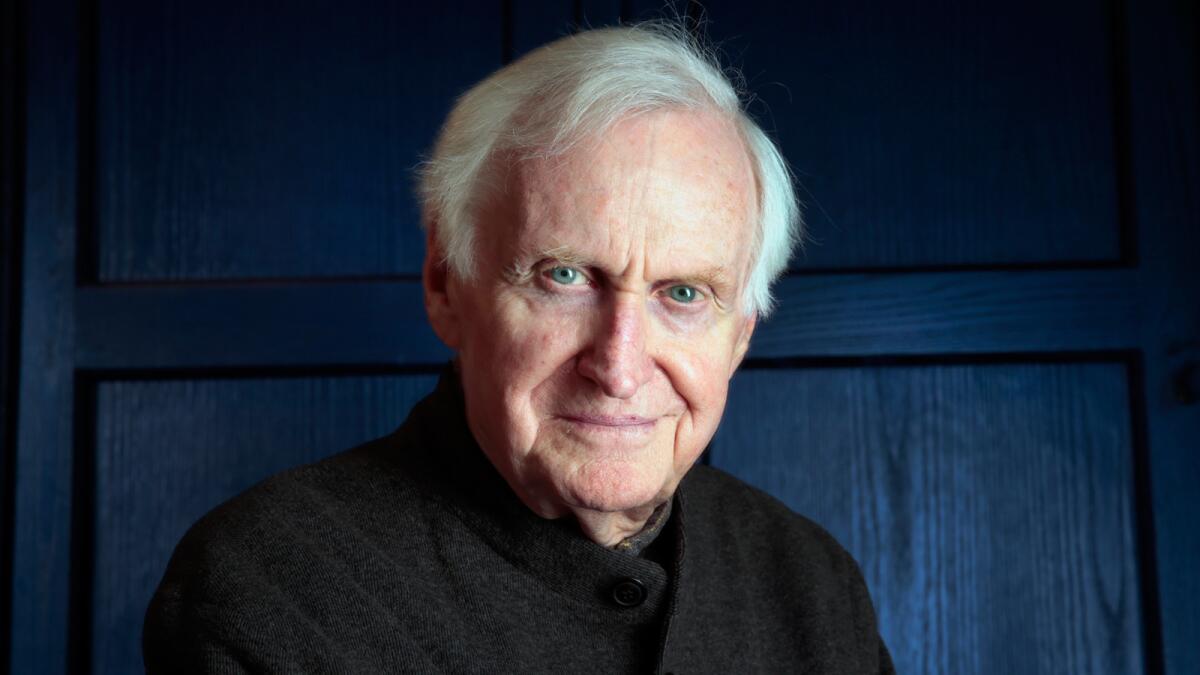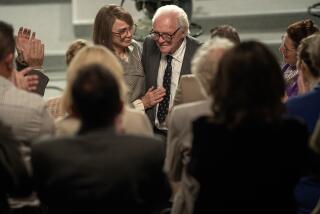Classic Hollywood: John Boorman catches up with alter ego in ‘Queen & Country’

English filmmaker John Boorman at the BBC headquarters in New York on Feb. 19, 2015.
John Boorman has made a lot of tough-nosed, violent and demanding films, including the 1967 film noir “Point Blank” with Lee Marvin, the Oscar-nominated 1972 thriller “Deliverance,” starring Burt Reynolds and Jon Voight, and “Excalibur,” the visceral 1981 dramatic fantasy based on King Arthur and the Knights of the Round Table.
But the 82-year-old British filmmaker showed his softer side in “Hope and Glory,” the charming Oscar-nominated 1987 comedy-drama based on his own experiences growing up during the World War II Blitz. “Hope and Glory” ended with his 9-year-old alter ego, Bill, rejoicing that his school had been destroyed by a wayward German bomb.
Boorman always had in mind to do a sequel. But it took him nearly 27 years to make “Queen & Country,” which opened in Los Angeles on Friday. The comedy-drama follows the adventures of the now-18-year-old Bill (Callum Turner) as he begins his two-year conscription in the army during the Korean War.
One reason Boorman waited so long was because there was an issue with his attorneys, who thought that because the characters in the film were based on real people, “they might be offended and might want to sue us,” Boorman said over the phone from New York.
“I’m talking about the older characters. But by this time, they are probably all dead now or too old to go to the trouble of suing.”
The England Boorman depicts in “Queen & Country” is far different from the Great Britain at the outset of “Hope and Glory.”
“The older soldiers who had been through the war were still hanging on to the idea of empire and imperial Britain,” said Boorman. “For the younger ones, it was clear to us everything was going to change. The British Empire was the biggest empire the world had ever known, and within a few years that was all gone.”
It was a massive change for the country — and a good one, as far as Boorman was concerned. “England became a much better country. The class system, which you see in the film, was much weakened, and in a few years time, the Beatles and the Rolling Stones were around.”
Like Bill in the film, Boorman was very much an observer at 18. He was a movie buff — his family lived near Shepperton Studios — and he noted, “I felt very much at the time if you made movies, you could make things come out much better than they do in life.”
Boorman has said that “Queen & Country” is his swan song, but he’s beginning to change his mind. “I am tempted to do another one.”
“Queen & Country” producer Kieran Corrigan, who runs the Irish production company Merlin Films with Boorman, described the filmmaker as tremendously focused.
“When he really decides to do something, he puts a phenomenal amount of effort into it and thought and consideration,” he said. “When he’s making a movie, it’s like a full, absolute commitment. He garners tremendous loyalty. When you work with John, you are always a friend.”
Boorman, who lives in County Wicklow, Ireland, has had a lot of friends during his long career.
After making documentaries and drama films for the BBC, Boorman started to get offers to do feature movies.
Enter producer David Deutsch, said Boorman, who “was always encouraging me to do a film.”
“Eventually, he came to me and said, ‘If you do a film with the Dave Clark Five, you can have carte blanche and do whatever you like.’”
The result, the 1965 musical romance “Having a Wild Weekend” — known as “Catch Us If You Can” in England — starring the red hot British pop group, impressed critics, including the New Yorker’s powerful Pauline Kael.
“She praised it much more than it deserved, and as result of that I started getting offers from Hollywood,” noted Boorman.
Boorman was sent the script to “Point Blank” at the same time as Oscar-winning actor Marvin, who was in London to make “The Dirty Dozen.”
“We met and Lee said to me, ‘What do you think of the script?’ I said, ‘I think it’s really feeble.’ He said, ‘Well, I agree with you, so what are we talking about?’ I said the character is interesting. We met a number of times, and I sort of wove this story together. Eventually, Lee said, ‘I’ll do this flick with you on one condition.’ He picked the script up and he threw it out the window.”
MGM and the producers were angry that Marvin had agreed to do a film that had no script with a young British director. But Marvin, who also starred in Boorman’s 1968 picture “Hell in the Pacific,” had total trust in the filmmaker. At a meeting with the producers and the head of the studio, Marvin “reminded them in his contract he had script and cast approval,” Boorman said.
“He said, ‘I defer those approvals to John,’ and he turned on his heels and walked out. You had never seen such glaring, angry men as these producers and the head of the studio looking at me because I had complete control of the movie.”
Boorman ran into difficulties with the studio brass after he edited “Point Blank.” He had already shown it to veteran editor Margaret Booth, the supervising editor at the studio since 1939, who had made a few suggestions.
“Then I had to show it to the executives,” recalled Boorman. “When the lights went up, they started mumbling about reshoots. Margaret Booth sat in the back of the cinema and said, ‘You touch a frame of this movie over my dead body.’ They were all scared of her. I was extremely lucky to get Lee’s support at the beginning and hers at the end.”
More to Read
Only good movies
Get the Indie Focus newsletter, Mark Olsen's weekly guide to the world of cinema.
You may occasionally receive promotional content from the Los Angeles Times.







